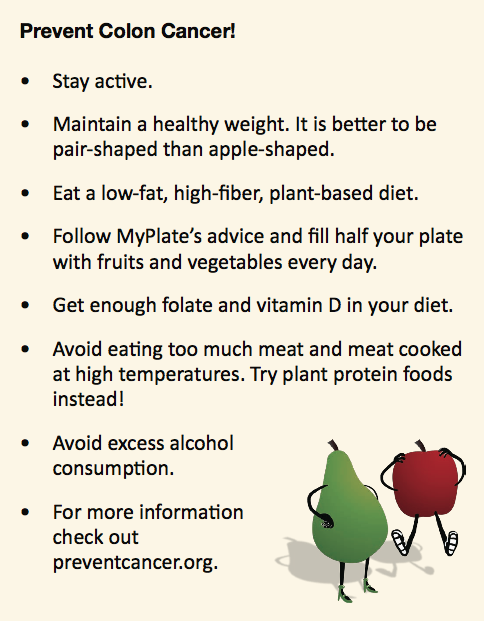What Endangers Your Colon?
 Sedentary LifestyleA sedentary lifestyle promotes colon cancer. Sedentary activities include things like...
Sedentary LifestyleA sedentary lifestyle promotes colon cancer. Sedentary activities include things like...
- Watching television. • Sitting at a desk. • Surfing the web. Learn ways to be less sedentary:
- Try to be more active during your leisure time. Find new activities that include at least some exercise -- directly or indirectly.
- Do active housework. • When it’s safe, park farther away from your destination and walk.
- Take the stairs instead of an elevator or escalator.
- Go for a walk or jog during your lunch break. No time during lunch? Go after work instead!
AlcoholAlcohol destroys folic acid, which is a key to good health. Consider supplementing your diet with 400 mcg of folic acid per day if you do not plan to give up alcohol.Limit alcohol consumption to no more than...
- 1 drink per day (women).
- 2 drinks per day (men).
Excess CaloriesExcess calories usually come from energy-dense foods. These foods are usually...
- Low in fiber.
- High in fat.
- High in sugar.
Too Many Refined CarbohydratesChronic elevations of insulin and insulin growth factors (IGF) increase your colon cancer risk.
- Eating high-sugar, refined-carbohydrate foods triggers excessive insulin and IGF production, which can increase the growth of cancer cells in the colon.
- High sugar/refined carbohydrate foods include foods made with sugars and white flour. Replace these with fruits, vegetables, or whole grain foods.
Red and Processed MeatsRed and processed meats contain elements that can increase your risk of colon cancer.
- Eat no more than 3 ounces of beef, pork, or lamb per day. Choose chicken, legumes and fish more often.
- Limit your consumption of processed meats like hot dogs, bacon, sausage, and deli meats.
Grill smart! Cancer-causing compounds are produced when meats are cooked at very high temperatures.Grill vegetables, tofu, and fruit instead.If you choose to grill meat...
- Use marinades.
- Flip frequently.
- Remove fat.
- Use foil and avoid direct flame.
- Do not eat charred meat.


